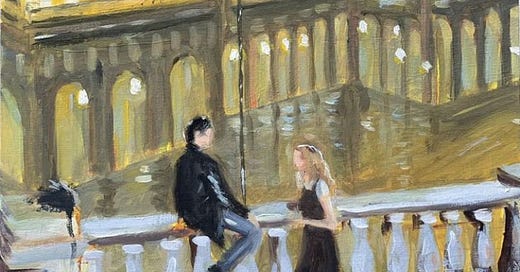the labor of love: a review of alain de botton's ‘the course of love’
in the spirit of valentine’s
February – a month of love, a time for romance. When I step out of my house on the 14th, I’m greeted by swathes of red and pink, bouquets of fresh-cut flowers. I recognize that Valentine’s Day is just another capitalistic holiday designed to get people to dig deep into their pockets, but I love seeing this public display of affection from strangers nonetheless. More importantly, I appreciate the act of taking the time to celebrate your loved ones, no matter the version of ‘love’ that exists between you.
It got me thinking about Alain de Botton's The Course of Love – one of my favourite books that, to this day, has left an indelible impression on me. I first read it when I was single in my early twenties and miserably on dating apps. I knew so little of love then. I only knew I wanted to be loved. It might seem foolish, admittedly, but it was true. And yet, the piercing realism of relationships in The Course of Love deeply moved me. I could not yet comprehend then, of course, the everyday disputes and flashes of romance between two people. I had only hoped that I would have the privilege of experiencing that with someone.
Enter the premise of The Course of Love: “We seem to know far too much about how love starts, and recklessly little about how it might continue.”
This is a story of how love continues.
We meet Rabih and Kirtsen, following them along their intentionally ordinary lives across more than a decade. They meet, they fall in love, they marry, they encounter small obstacles in their personal and professional lives, they have children.
What I love the most is how de Botton is able to capture tender moments between lovers with ease. There’s a subtle, quiet beauty that lingers in the couple’s story – almost heartachingly so. Towards the end of the novel, when they finally find themselves alone at a restaurant for the first time in years, they experience a giddy sense of defamiliarization. Rabih realizes there are still acres of unexplored territory between them and suddenly recognizes the beauty of his wife once more. Kirsten, in turn, feels a reawakened sense of interest, “making her brave — brave enough to be weak.” During this reconciliatory meal, Rabih and Kirsten recognize “the weird and exotic achievement” of having stuck it out for so many years, and “feel a loyalty to their battle-hardened, scarred version of love.” And from there, the relationship will continue its unpredictable course, full of both epiphanies and setbacks.
‘Sorry, Mr Sfouf, that I haven’t always been who you wanted me to be.’
He strokes her bare arm and replies, ‘Yet you’ve been so much more.’
They feel a giddy loyalty towards what they have built up together: their disputatious, fractious, laughter-filled, silly, beautiful marriage that they love because it is so distinctly and painfully their own. They feel proud to have come this far, to have kept at it, trying again and again to understand the lunacies in each other’s minds, hammering out one peace accord after another.
Along the way, de Botton interjects their story with commentaries on love, which I enjoy. This is a favourite of mine:
“At the heart of a sulk lies a confusing mixture of intense anger and an equally intense desire not to communicate what one is angry about. The sulker both desperately needs the other person to understand and yet remains utterly committed to doing nothing to help them do so. The very need to explain forms the kernel of the insult: if the partner requires an explanation, he or she is clearly not worthy of one. We should add: it is a privilege to be the recipient of a sulk; it means the other person respects and trusts us enough to think we should understand their unspoken truth. It is one of the odder gifts of love.”
The Course of Love effortlessly strikes at the heart of enduring relationships – accepting your partner as they change over the years, and showing grace when they do.
While four years are probably minuscule in comparison to long-standing marriages, I feel lucky to have gone through life so far with my partner. From our first date, I was certain I’d met somebody who would be special to me. Since then, we’ve evolved into many different versions of ourselves. Growing together throughout our twenties (and with a history of our shared childhood) has been such a privilege. I’m immensely grateful. I really am.
“If I loved you less, I might be able to talk about it more.” — Jane Austen




